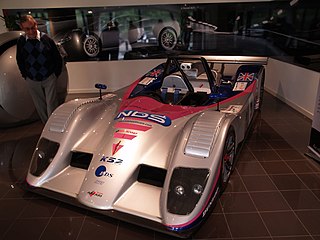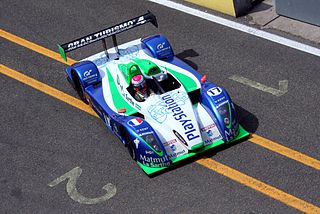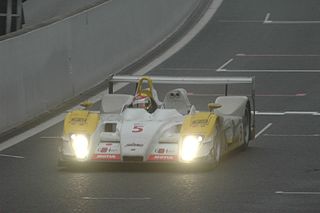
ORECA is a French racing team and race car constructor, founded in 1973 and run by Hugues de Chaunac, former team manager of F1 team AGS. Oreca has had success in many areas of motorsport. Since the early 1990s the team has concentrated on running sports cars and GT cars.
The World Sportscar Championship was the world series run for sports car racing by the FIA from 1953 to 1992.
The 1998 Petit Le Mans was the seventh race for the 1998 IMSA GT Championship season, then known as the Professional SportsCar Racing series. It also served as a prelude to the first American Le Mans Series race held at Sebring in 1999. Don Panoz's American Le Mans Series was developed with the backing of the Automobile Club de l'Ouest (ACO), the ruling body of the 24 Hours of Le Mans. It took place on October 11, 1998.
Debora Racing cars is a small French car builder, popular with private racing teams, based in Besançon, France. Teams generally use their chassis to take part in Le Mans style endurance racing such as Magny Cours, Jarama and le Mans.

Lucas Luhr is a German BMW factory racing driver, currently competing for BMW and Rahal Letterman Lanigan Racing in the GTLM category of the Tudor United SportsCar Championship.

The Debora LMP296 was a Le Mans Prototype, built by Debora Automobiles in 1996 for use in the 24 Hours of Le Mans. The car was originally entered with a 2-litre turbocharged Cosworth straight-four engine, but several other engines were used in the car's three-year career. Two cars are known to have been built. In conjunction with the LMP297, the car helped Waterair Sport to the International Sports Racing Series SR2 Team's Championship in 1998. The LMP296 was updated into the LMP299 for 2000.
The Debora LMP2000 was a Le Mans Prototype, built by Debora in 2000 for use in the 24 Hours of Le Mans and the Sports Racing World Cup. The car was initially fitted with a 3.2-litre BMW straight-six engine, but had a 3-litre BMW straight-six fitted for the Sports Racing World Cup. One chassis is known to have been built.
The Debora LMP295 and Debora LMP201 were Le Mans Prototypes built by Debora in 1995 for the 24 Hours of Le Mans. One of each type was built, and both cars featured the same 2-litre Cosworth-Ford turbocharged straight-four engine. Both cars were only entered in the 1995 24 Hours of Le Mans, whilst the LMP295 took Didier Bonnet Racing's best ever result in the race.
The Debora SP93 was a C3 class sports-prototype built by Debora for hillclimbing and for the French Coupe Alfa Romeo. It was updated to the Debora LMP294 in 1994 for the same event. Both cars were fitted with a 3-litre Alfa Romeo V6 engine, and both were run at the 24 Hours of Le Mans by Didier Bonnet Racing. Only two chassis, #C393-01 for Le Mans and #C393-02 for the "Coupe Alfa Romeo", were built, and were used for both the SP93 and the LMP294.
The Debora SP92 was a Le Mans Prototype built by Debora in 1992 for the 24 Hours of Le Mans. Didier Bonnet Racing ran the car, which was fitted with a 3-litre Alfa Romeo V6 engine, in the race. Only one was built, and it was not used again after the 1992 24 Hours of Le Mans, being replaced by the Debora SP93.

The Ascari A410 was a Le Mans Prototype built by Ascari Cars in 2000. The car, which was based on the Lola T92/10 Group C racing car, featured a 4-litre Judd GV4 V10 engine, and was used in European and international sports car racing events. In 2002, it was renamed as the Ascari KZR-1 and shipped to the United States for usage in the American Le Mans Series. Two cars were built.
The GMS Durango LMP1 was a Le Mans Prototype built for Durango by GMS in 2000. Initially fitted with a 4-litre BMW V8 engine, which was prepared by Mader, a Judd GV4 V10 was fitted in its place for the 2002 season. Durango replaced the car with their own PM 02 for the 2003 season. The GMS Durango LMP1 was not particularly successful, and had a weak gearbox; but it was able to win one race, the 2002 6 Hours of Vallelunga.
The Rapier 6 was a sports prototype racing car built by LM3000 in 1999. It used a 3-litre Nissan V6 engine, and Team Sovereign ran the car in the FIA Sportscar Championship. The car achieved moderate success, and Team Sovereign retired it at the end of the 2003 season, after the series folded. In 2011, it reappeared in the Britcar series, being driven by Mike Millard.

The Courage C60 was a Le Mans Prototype (LMP) racing car built by Courage Compétition in 2000, and used in international sports car races until 2006. A replacement for the Courage C52, it was Courage's first all-new prototype since the Courage C41 was built in 1994.
The 2016 FIA World Endurance Championship season was the fifth edition of the FIA World Endurance Championship auto racing series co-organised by the Fédération Internationale de l'Automobile (FIA) and the Automobile Club de l'Ouest (ACO). The series was open to Le Mans Prototypes and grand tourer-style racing cars meeting four ACO categories. The season began at the Silverstone Circuit in April and ended at the Bahrain International Circuit in November, and included the 84th running of the 24 Hours of Le Mans. This season was also the last WEC season for Audi Sport Team Joest as they decided not to race in the 2017 FIA World Endurance Championship Season.
The 2017 FIA World Endurance Championship was the sixth season of the FIA World Endurance Championship, an auto racing series co-organised by the Fédération Internationale de l'Automobile (FIA) and the Automobile Club de l'Ouest (ACO). The series is open to Le Mans Prototypes and grand tourer-style racing cars divided into four categories. The season began at the Silverstone Circuit in April and will end at the Bahrain International Circuit in November, and include the 85th running of the 24 Hours of Le Mans. World championship titles will be awarded to the leading prototype drivers and manufacturers, while for the first time in the World Endurance Championship the leading grand touring drivers and manufacturers will also be awarded a world championship.
The 2018–19 FIA World Endurance Championship was the seventh season of the FIA World Endurance Championship, an auto racing series co-organised by the Fédération Internationale de l'Automobile (FIA) and the Automobile Club de l'Ouest (ACO). The series is open to Le Mans Prototypes and grand tourer-style racing cars divided into four categories. The season marked the first move to a winter schedule for the championship, with the season starting at the Circuit de Spa-Francorchamps in May 2018 and concluding at the 24 Hours of Le Mans in June 2019. World championship titles were awarded for LMP drivers, GTE drivers, LMP1 teams and GTE manufacturers.

The Dome S101, later upgraded and raced as the Dome S101 Hb, S101 Hbi, and the Dome S101.5, is a sports prototype built and designed for use in the LMP1 class of the 24 Hours Of Le Mans, and other similar endurance races. The car was the predecessor to the Dome S102, and the Strakka-Dome S103. The car had its racing debut at the 2001 Barcelona 2 Hours and 30 minutes, the opening round of the 2001 FIA Sportscar Championship, with the Den Blå Avis racing team.












